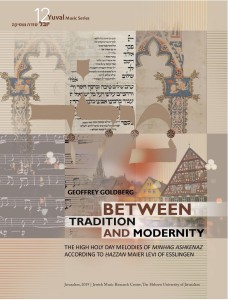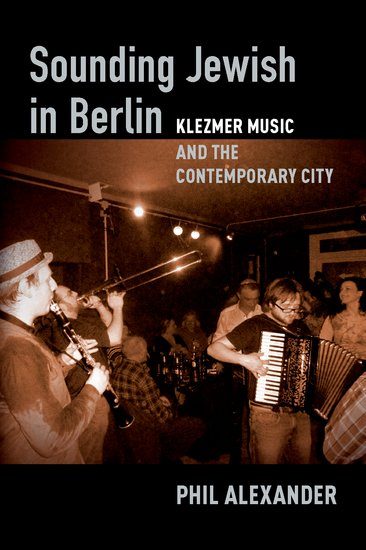You are currently browsing the tag archive for the ‘Germany’ tag.
Between Tradition and Modernity: The High Holy Days Melodies of Minhag Ashkenaz According to Ḥazzan Maier Levi of Esslingen. Geoffrey Goldberg. Jerusalem: Jewish Music Research Centre – Hebrew University of Jerusalem. 2019.
Reviewed by Marsha Bryan Edelman

Ethnomusicologist Abraham Zvi Idelsohn (1882-1938) put the study of Jewish music on the scholarly map with the publication of his 10-volume Thesaurus of Hebrew Oriental Melodies (Leipzig: Breitkopf & Härtel et al., 1914–32). Long considered an authoritative resource, Idelsohn’s work has come under some scrutiny by more recent research and by the discovery of additional materials that complement, and occasionally contradict, Idelsohn’s conclusions. The Yuval Music Series, launched by the Jewish Music Research Centre at the Hebrew University of Jerusalem in 1989, has endeavored to provide a sequel to Idelsohn’s research. Geoffrey Goldberg’s Between Tradition and Modernity: The High Holy Day Melodies of Minhag Ashkenaz according to Hazzan Maier Levi of Esslingen is Volume 12 in the Yuval Series, and a most worthy contribution.
Maier Levi (1813 – 1874) is not a well-known name in the history of cantorial music, nor was Esslingen a major center of Jewish life. What makes the present work so valuable is that Levi served as a teacher of hazzanut and prepared his compendium as a study tool for his students at the Esslingen Teachers Seminary from which Levi had also graduated, although at the time, training in hazzanut was very limited; Levi enhanced his own cantorial knowledge through private study with other local hazzanim. In addition to providing details about Levi’s life and career, Goldberg also recounts the history of the types of training available to nineteenth-century hazzanim in Germany (only some of which Levi himself experienced). The key takeaway from this historical background is that Levi lived and taught at a pivotal moment brought about through the Emancipation of German Jewry (1848) and the aesthetic revisionism of the emerging Reform movement (1819). His compendium, completed over the course of many years (1845-late 1860s) thus reflects the changing musical styles Levi and his students would have experienced, and his notations reflect the evolution from “old-world,” often highly embellished tunes, to the more “modern” and unadorned chants in vogue during his later years.
Read the rest of this entry »Sounding Jewish in Berlin: Klezmer Music and the Contemporary City. Phil Alexander. Oxford: Oxford University Press. 2021.
Reviewed by Zeke Levine
For the past two centuries, Berlin has maintained its role as a central crossroads of global politics, culture, and geography. The German capital is the focus of Phil Alexander’s Sounding Jewish in Berlin. Alexander probes the lively, yet complex contemporary Berlin klezmer scene, delving deeply into the ideological and aesthetic issues that shape it. While the klezmer revival has its roots in the United States, Alexander effectively and engagingly transports the reader to Berlin, an important locus for klezmer performance since the 1980s. Berlin, notes Alexander, is a complex setting for klezmer, given the city’s conflicted relationship with Jewish, particularly Eastern European Jewish, communities and folkways. Throughout the text, Alexander highlights thirty musicians and other creatives on the Berlin scene, framing the book around their experiences as well as his own extensive ethnographic experience as both a performer in, and keen observer of, the scene.
Read the rest of this entry »Music in Terezín 1941-1945. Joža Karas. 2nd ed. Hillsdale, NY: Pendragon Press, 2009. ISBN 978-1-5764-7030-5
The Wonder and the Grace of Alice Sommer Herz: Everything is a Present. Dir. Christopher Nupen. DVD and Liner Notes. Allegro Films, 2009.
Shortly before his death in December 2008 Joža Karas completed the second edition of his book Music in Terezín 1941-1945, the culmination of a life’s work. When the book was originally published in 1985 it was path-breaking, documenting a largely unknown chapter in the history of the Holocaust: the lively and wide-ranging musical life in the “model ghetto” Terezín (in Czech, Theresienstadt in German). When Karas began his work as a “modest summer project” in 1970 (ix), very little music from the ghetto had been uncovered, and even less had been written about it. Karas, a Czech researcher and musician based in Connecticut, devoted the rest of his life to passionately researching the subject, conducting interviews across Europe, Israel, and the United States, undertaking archival research, and transcribing scores. In addition to publishing his book, he lectured widely on the subject, produced performing editions, and tirelessly promoted Terezín compositions in performances with his own string quartet, established expressly for that purpose. Karas himself conducted the American premiere of Brundibár in 1975 and the world premiere of the English version (in his own translation) in 1977. In short, the subject of music in Terezín has become well known among Western audiences thanks in large part to Karas’s pioneering efforts. Read the rest of this entry »
Judaism Musical and Unmusical. Michael P. Steinberg. Chicago: University of Chicago Press, 2007. 270 pp. ISBN 978-0-2267-7195-3
In Judaism Musical and Unmusical, Michael P. Steinberg takes the reader on a journey through predominantly but not exclusively Central European Jewish history and culture in the nineteenth and twentieth centuries, at times privileging music as a focal point of cultural discourse. The eight essays in this volume, most of which have been published before, are loosely connected musings about the different facets of modernity and Judentum, and involve the concepts of memory, secularity, and aesthetics, among others. In each chapter Steinberg weaves different threads together, from art to psychoanalysis, from architecture to music. Steinberg’s book, which in a larger sense is a discourse about identity and Judaism, begins with an essay on Edward Said and his propositions of Jewish identity, and follows with individual case studies of known intellectuals and their work. Steinberg traces the subject of Judaism in Sigmund Freud’s late classic Moses and Monotheism and in the writings of Henry James, Eduard Fuchs, and Walter Benjamin; and he explores the intellectualism of Italian Jewish historian Arnaldo Momigliano. Further chapters center on the artist Charlotte Salomon and her Life? or Theater? and Leonard Bernstein in Vienna. The journey ends in Berlin with a critique of its Jewish Museum and an assessment of some recent scholarship on German Jewish subjects, which cannot compensate for the absence of a full bibliography at the end of the book.


 During the last two decades a formidable number of excellent studies have appeared in English and German that have given us an ever fuller picture of the compromised, politicized reality of Germany’s musical culture during the National Socialist period. Lily Hirsch’s book, A Jewish Orchestra in Nazi Germany: Musical Politics and the Berlin Jewish Culture League, is a valuable contribution to this body of knowledge.
During the last two decades a formidable number of excellent studies have appeared in English and German that have given us an ever fuller picture of the compromised, politicized reality of Germany’s musical culture during the National Socialist period. Lily Hirsch’s book, A Jewish Orchestra in Nazi Germany: Musical Politics and the Berlin Jewish Culture League, is a valuable contribution to this body of knowledge.

